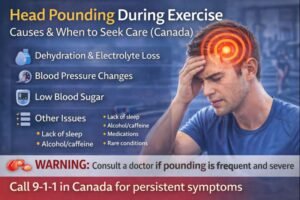Head Pounding During Exercise: Causes & When to Seek Care (Canada)

1. Dehydration & Electrolyte Loss
To function efficiently, the body requires adequate water to maintain blood volume. When dehydrated:
-
Blood pressure drops
-
The heart works harder to circulate blood
-
Head pounding can occur during or after activity
Other symptoms include:
Dizziness • Dry mouth • Fatigue • Reduced urination
Hydration tips:
-
Drink 1–3 cups of fluid before exercise
-
Replace losses after activity with water or electrolyte beverages
2. Blood Pressure Changes (High or Low)
Both high and low blood pressure can trigger head pounding sensations:
-
Low BP — may result from dehydration, malnutrition, or certain medications
-
High BP — often symptomless but can spike during exertion, causing pounding in the head
If pounding is linked to exercise and recurs, medical consultation is recommended to rule out hypertension or cardiovascular disease.
3. Low Blood Sugar (Hypoglycemia)
Glucose fuels the brain and muscles. When levels drop:
Symptoms may include:
Confusion • Fatigue • Dizziness • Headache • Head pounding
This is common in diabetics but can occur with poor nutrition or skipped meals.
4. Additional Possible Triggers
While exercise is often an aggravating factor, other contributors include:
-
Lack of sleep
-
Alcohol intake
-
Stimulants (e.g., caffeine)
-
Certain medications
-
Rare structural issues (vascular abnormalities, migraines, tumors)
When to Seek Medical Care
Consult a healthcare provider if:
-
Head pounding appears regularly with exertion
-
Symptoms occur despite hydration and nutrition
-
Dizziness, visual changes, nausea, fainting, or confusion develop
Persistent exertional headaches warrant evaluation to rule out cardiovascular, neurological, and metabolic causes.
Canadian First Aid & CPR Training Connection
Symptoms such as dizziness, headache, and fainting can overlap early signs of stroke, heart attack, heat-related illness, or shock — all of which are covered in St Mark James Training & WSIB-approved first aid and CPR courses.
Workplace first aid training teaches how to:
✔ Recognize medical red flags
✔ Monitor vital signs
✔ Support someone until EMS arrives
✔ Activate 9-1-1 efficiently
These skills are valuable for athletes, coaches, gym staff, and workers in physically demanding environments.
Call to Action — Training in Canada
Interested in improving emergency response skills?
We provide First Aid, CPR, AED & WSIB-Approved Workplace Safety Training across Canada, including blended, in-class, and on-site group options.
Medical Disclaimer (Required)
This content is for general information only and is not medical advice. Consult a healthcare provider for personalized assessment and treatment. Call 9-1-1 in Canada for any medical emergency.
